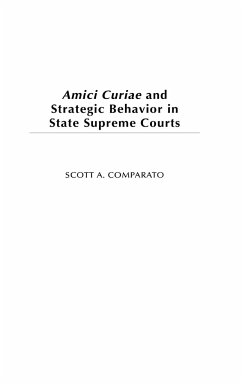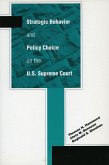Applying strategic approaches to both interest groups as amici curiae and state supreme court justices, Comparato investigates the influence of judicial retention methods and the ballot initiative on their behaivor. The results demonstrate that they behave strategically, attempting to achieve their goals within the confines of the institutional setting. What impact do state-level institutions have on the behavior of state supreme court justices and interest groups participating as amici curiae in those courts? Specifically, is the information provided by interest groups conditioned on the judicial retention system, or whether the state uses the ballot initiative, and does that information impact the decision-making process of the justices? Comparato answers these questions by employing strategic theories of judicial and group behavior, with groups motivated by the attainment of policy and group maintenance, and state supreme court justices motivated by policy and the continued maintenance of their position on the court. He argues that the information provided in amicus curiae briefs allows both groups and state supreme court justices to achieve their respective goals. In order to answer these questions, Comparto analyzes litigant and amicus curiae briefs as well as judicial decisions from seven state supreme courts to evaluate the effects of state-level institutions on the types of information provided to state supreme court justices, and how those justices respond to that information. The results suggest that interest groups do behave strategically, providing information to justices that they believe will be useful in helping the justices retain their seats on the court and achieve their desired policy outcomes. There is also support for the expectation that the information provided by litigants and amici, as well as the retention method, have a direct impact on the decision-making of justices.
Hinweis: Dieser Artikel kann nur an eine deutsche Lieferadresse ausgeliefert werden.
Hinweis: Dieser Artikel kann nur an eine deutsche Lieferadresse ausgeliefert werden.








